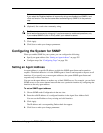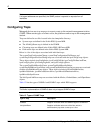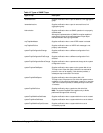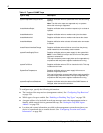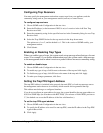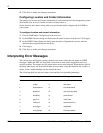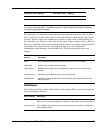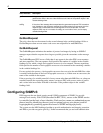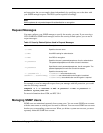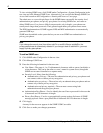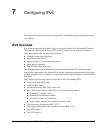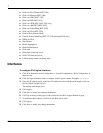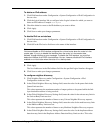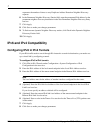
Nokia Network Voyager for IPSO 4.0 Reference Guide 263
and encryption, but you can employ them independently by specifying one or the other with
your SNMP manager requests. The IPSO system responds accordingly.
Note
Nokia systems do not protect traps with authentication or encryption.
Request Messages
You must configure your SNMP manager to specify the security you want. If you are using a
UCD-SNMP/Net-SNMP based manager, here are the security-related options you can use in
request messages:
For example, to send an snmpwalk request from your manager with full protection, you would
enter the following command:
snmpwalk -v 3 -u username -a MD5 -A password -x DES -X password -l
authPriv system_name OID
For more information about USM, see RFC 3414.
Managing SNMP Users
SNMP users are maintained separately from system users. You can create SNMP user accounts
with the same names as existing user accounts or different. You can create SNMP user accounts
that have no corresponding system account. When you delete a system user account, you must
separately delete the SNMP user account.
Table 13 Security Related Options Used in Request Messages
Option Description
-u name
Specifies the user name.
-a MD5
Use MD5 hashing for authentication.
-x DES
Use DES for encryption.
-A password
Specifies the user’s password/passphrase. Use for authentication.
The password/passphrase must have at least 8 characters.
-X password
Specifies the user’s password/passphrase. Use for encryption. The
password/passphrase must have at least 8 characters.
-l [authNoPriv |
authPriv | authPrivReq]
Specifies the security level:
•
authNoPriv
: use authentication only
•
authPriv
: use authentication and encryption is enabled
•
authPrivReq
: use authentication and encryption is required



